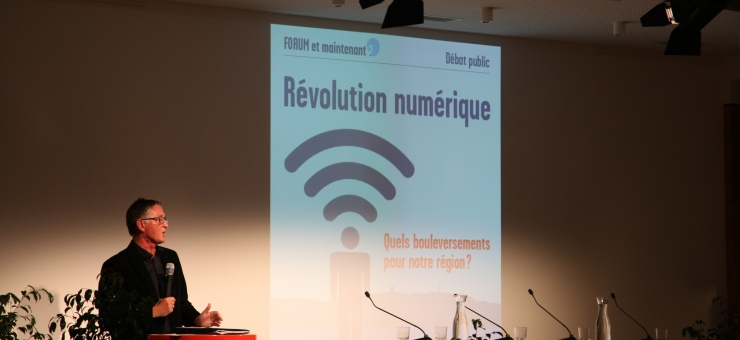News
UNI Forum exposes growing digital gap in Switzerland

The 8th Annual “What’s Next?” Forum, held in collaboration between UNI Global Union, the municipality of Nyon and local TV and newspapers, put its finger on the growing threat of a digital divide not just in the Vaud region but Switzerland and the wider world. The event, which is a fixture in the Nyon political calendar, gathered people from all walks of life to discuss current issues. “What’s Next?” is an integral part of UNI’s outreach to the local community.
There was standing room only in the UNI Global Union conference hall packed with more than 200 local people, including teachers, shop-owners, and local politicians all eager to have their say and discover how the future world of work would affect them.
After showing a clip of Charlie Chaplin being sucked into a machine in the classic worker’s film Modern Times, UNI Global Union General Secretary Philip Jennings said, “I feel like a Digital Charlie Chaplin - we are all in danger of becoming latter day Charlie Chaplins sucked into the digital machine. At UNI, we are leading the search for solutions on the labour-side and I would urge Nyon and the wider region of Vaud and Switzerland to face up to the challenges before it’s too late.”
There was a consensus from the Swiss at the Forum, both from panellists and the floor that Switzerland appears to be late to the game in facing up to the risks and opportunities of the Future World of Work.
“In Switzerland, we have understood nothing about the digital world – we are in ‘la merde’ as you say”, said Xavier Comtesse, Mathematician and former Director of Avenir Suisse. Switzerland are late to the game in terms of response to the changing labour market and world – schools are resistant to the idea of digitalisation and institutions are burying their heads in the sand.”
Pierre Dillenbourg, Professor of Technology education at EPFL said, “We must not leave the schools of tomorrow in the hands of Google, Facebook and the others. Who should invent the education of the future? It’s us! But we must act now before it’s too late.”
Spokespeople from Google and Uber shook off accusations that their companies were acting irresponsibly and putting profits before people. Despite strong evidence to the contrary, Alexandre Molla, Director of Uber in French-speaking Switzerland argued that Uber was contributing to the local economy by injecting money and creating decent jobs in the region. Research provided by UNI and its affiliates has shown that working for Uber is a precarious and insecure job with no social provisions. Molla added that it was important for Uber to build partnerships in a reasonable way.
“We’re not in the business of rectifying social problems – our expertise and our work is technology,” said Google spokesperson Karl Ryan, which earned him a tough rebuke from Professor Dillenbourg.
“This lack of responsibility from tech companies shows why we’re in this mess,” said Dillenbourg. “Fake news, pedalled by Facebook, Google and the rest, led to the election of Donald Trump. Therefore, tech companies should think long and hard about how their conduct effects the world and societies.”
Two prominent political leaders, Conseillère d’Etat Vaudoise in charge of digital strategy, Nuria Gorrite and Pierre Maudet, Conseiller d’Etat Genevois for the economy and digitalisation, were asked to come back with the policies to tackle the new world of work. Both determined that they are prepared not to ignore the regulatory authority they have -- which was already exercised in the case of Uber in Geneva. It’s clear that platforms must play by the rules. Nuria Gorrite gave an eloquent assessment of the key labour concerns on jobs, job content, skills, social insurance, and new forms of employment. All of these are of concern to us and are felt in the canton and in the country. The Swiss union centre published a policy report that placed people at the centre of the digital revolution. Daniel Rosselat, Syndic de Nyon said, “Even though we are enjoying record highs in terms of employment in Nyon, we must remain aware of the impacts of digitalisation. We are living in an age of digital transformation and we must endeavour to stay ahead of the game.”

